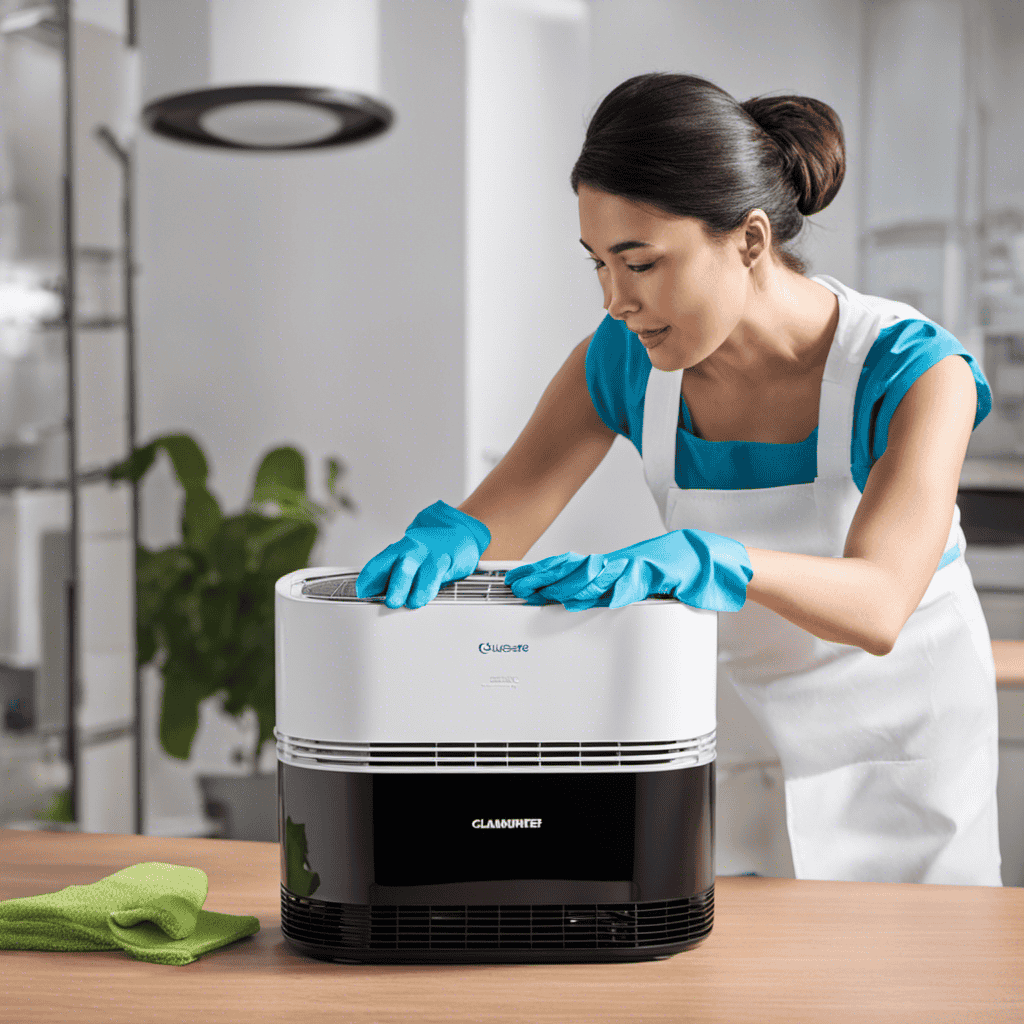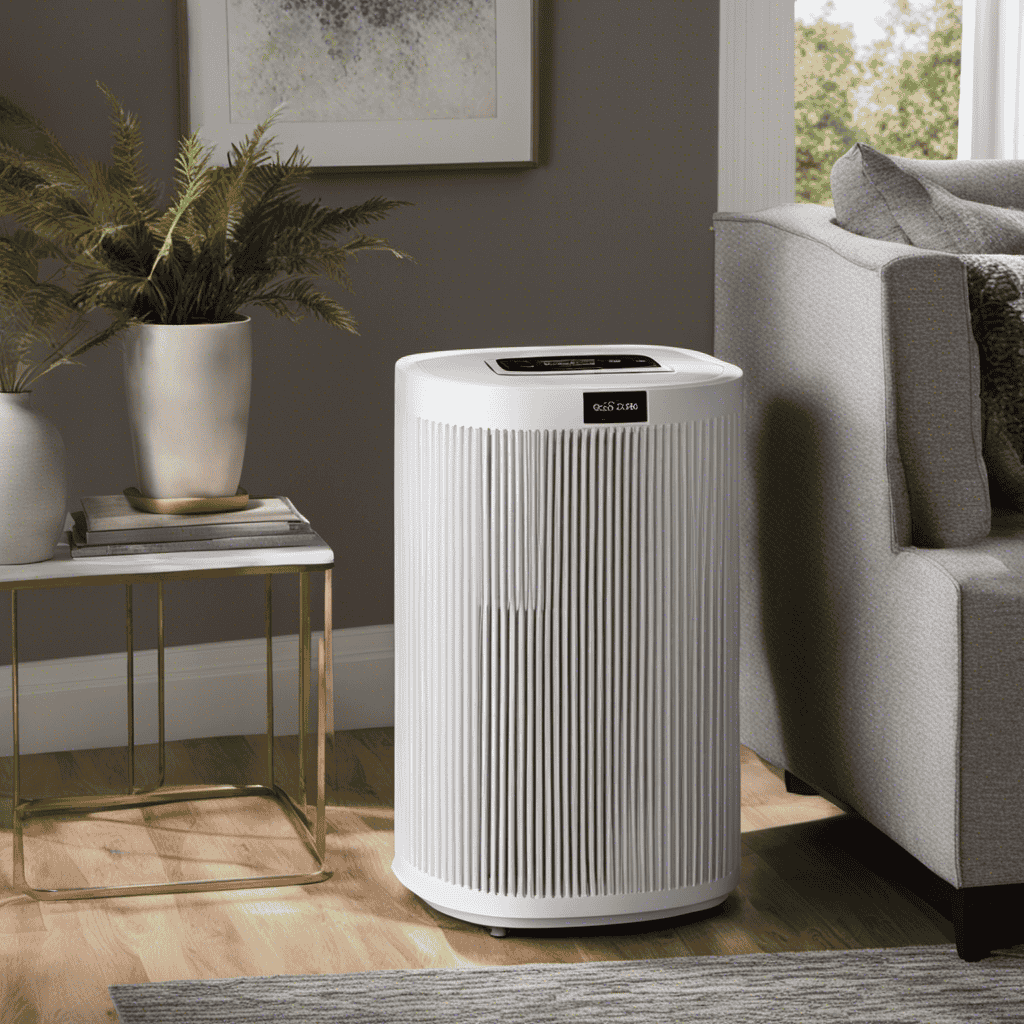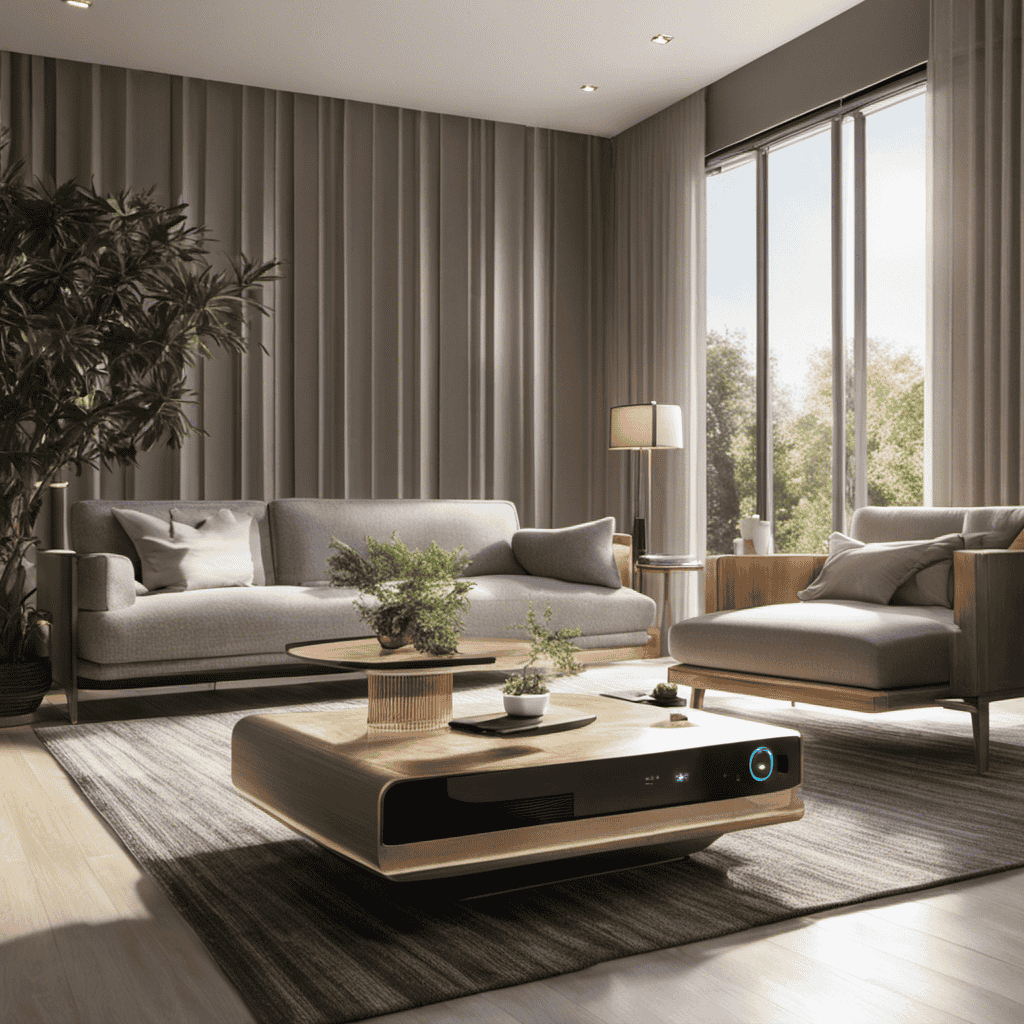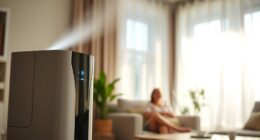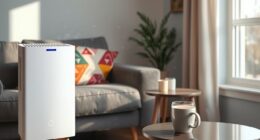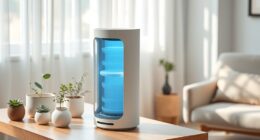It’s hard to envision my life without the air purifier. It has fundamentally altered my experience, turning the air around me into a clean and refreshing sanctuary.
In this article, I’ll share the incredible benefits of using an air purifier. From reducing allergies to improving sleep quality, these devices are a must-have for any home.
Discover when to use an air purifier and how it can enhance your overall well-being. Prepare to be amazed by the power of clean air.
Key Takeaways
- Air purifiers should be used to remove common allergy triggers like dust, pollen, and pet dander.
- They can eliminate odors and keep the air fresh in your home.
- Air purifiers are particularly beneficial for individuals with allergies or asthma.
- They create a more comfortable and pleasant indoor environment.
Health Benefits of Using an Air Purifier
Using an air purifier can help me breathe cleaner air and improve my overall health. Air purifiers play a crucial role in asthma management by filtering out allergens and irritants that can trigger asthma symptoms. They effectively remove pet dander, which is a common allergen that can cause respiratory issues in individuals with allergies or asthma. By reducing the amount of pet dander in the air, air purifiers create a healthier environment for those with sensitivities.
Breathing cleaner air can also have a positive impact on my overall health, as it reduces the risk of respiratory infections and improves sleep quality. With the use of an air purifier, I can enjoy cleaner air and better manage my asthma symptoms.
Allergies and Air Purifiers: How They Can Help
By reducing airborne allergens, air purifiers can help alleviate allergy symptoms. For pet owners, air purifiers are particularly beneficial, as they can effectively remove pet dander and other allergens from the air. This is especially important for individuals who have allergies or asthma, as pet dander can trigger severe respiratory reactions.
Similarly, air purifiers can also be helpful for smokers, as they can remove smoke particles and odors from the air, improving indoor air quality. Whether it’s pet dander or cigarette smoke, air purifiers work by trapping and filtering these allergens and pollutants, ensuring cleaner and healthier air to breathe.
When it comes to improving indoor air quality and reducing allergy symptoms, air purifiers are an excellent investment.
When to Use an Air Purifier in Your Home
When it comes to allergies and pollutants, using an air purifier can be a game-changer. It helps to remove airborne particles like dust, pollen, and pet dander, which are common triggers for allergies.
Additionally, air purifiers can also eliminate odors and keep the air in your home fresh, creating a more comfortable and pleasant environment.
Allergies and Pollutants
To alleviate your allergies and reduce pollutants in the air, you should consider using an air purifier. Air purifiers are effective in removing indoor pollutants such as dust, pet dander, mold spores, and pollen. These are common triggers for allergies, especially pollen allergies. By using an air purifier, you can significantly reduce the presence of these allergens in your home, providing relief for allergy sufferers.
To give you a better understanding of the effectiveness of air purifiers, here is a table showcasing the types of indoor pollutants that can be eliminated by using an air purifier:
| Types of Indoor Pollutants | Examples |
|---|---|
| Dust | Dust mites, dust particles |
| Pet dander | Pet hair, pet skin flakes |
| Mold spores | Mold growth, damp areas |
| Pollen | Tree, grass, and weed pollen |
Odor Elimination and Freshness
Eliminating odors and maintaining freshness in your home is easily achievable with the use of an air purifier. Whether you’re dealing with stubborn pet odors or lingering cooking smells, an air purifier can effectively remove these unpleasant odors and keep your home smelling clean and fresh.
By utilizing advanced filtration technology, air purifiers can capture and neutralize odorous particles in the air, leaving behind a more pleasant indoor environment. Not only do they eliminate odors, but air purifiers also help to improve the overall air quality in your home by removing allergens, dust, and other airborne contaminants.
So, not only will your home smell better, but you’ll also breathe easier knowing that you’re surrounded by cleaner, purer air.
Transitioning into the subsequent section, let’s explore how air purifiers can further enhance indoor air quality.
Air Purifiers for Improved Indoor Air Quality
I’ve found that air purifiers can provide numerous benefits for improving indoor air quality. They can help remove allergens, such as dust, pollen, and pet dander. This can be especially beneficial for individuals with allergies or asthma.
Additionally, there are different types of air purifiers available. These include HEPA filters, activated carbon filters, and ionizers. Each type has its own unique features and advantages.
Benefits of Air Purifiers
You’ll notice the benefits of air purifiers right away when you start using one.
Air purifiers are effective at removing pet dander from the air, which can be a major concern for pet owners with allergies. They work by trapping and filtering out the tiny particles of pet dander, reducing the allergen levels in your home. This can help alleviate symptoms such as sneezing, coughing, and itchy eyes.
Additionally, air purifiers can provide relief for individuals with asthma. They can remove common triggers such as dust mites, pollen, and mold spores from the air, creating a cleaner and healthier environment. By reducing the presence of these allergens, air purifiers can help minimize asthma symptoms and improve overall respiratory health.
Types of Air Purifiers
Now that we have discussed the benefits of air purifiers, let’s delve into the different types of air purifiers available in the market today.
There are various air purifier technologies that can help improve indoor air quality. One common type is the High-Efficiency Particulate Air (HEPA) filter, which effectively captures small particles such as dust, pollen, and pet dander.
Another option is the activated carbon filter, which is highly effective in removing odors and chemicals from the air.
UV germicidal irradiation is another technology that uses ultraviolet light to kill bacteria and viruses. Additionally, there are ionizers that release negative ions to neutralize airborne particles.
When considering air purifier options, it is important to look for cost-effective models that suit your needs and budget.
Maintenance and Cleaning
Regular maintenance and cleaning are essential for keeping your air purifier functioning optimally. Here are some maintenance tips to help you maintain the performance of your air purifier:
-
Replace filters regularly:
-
HEPA filters: These should be replaced every 6-12 months, depending on usage.
-
Pre-filters: Clean or replace them every 3 months, or as needed.
-
Clean the exterior:
-
Use a soft cloth to wipe the surface of the air purifier.
-
Avoid using harsh chemicals or abrasive materials that could damage the unit.
By properly maintaining your air purifier, you can ensure its efficiency in removing common air pollutants such as dust, pollen, pet dander, and smoke particles.
This not only helps to improve the air quality in your home but also contributes to the prevention of respiratory illnesses.
Air Purifiers and the Prevention of Respiratory Illnesses
Using an air purifier can help reduce the risk of respiratory illnesses. Air pollution is a major contributor to respiratory problems, and having an air purifier at home can help improve the quality of the air you breathe.
Air purifiers work by filtering out pollutants such as dust, pollen, pet dander, and smoke, which can irritate the respiratory system and trigger or worsen respiratory conditions. By removing these harmful particles from the air, air purifiers can help alleviate symptoms and improve respiratory health.
It is important to choose an air purifier that is suited for your specific needs and to regularly clean and maintain it to ensure its effectiveness.
Overall, incorporating an air purifier into your home can be a proactive step towards protecting your respiratory health.
Enhancing Sleep Quality With the Use of an Air Purifier
Having an air purifier in my bedroom has greatly improved my sleep quality. The benefits of using an air purifier include reducing allergies and improving overall air quality.
Here are some ways an air purifier can enhance sleep quality:
-
Removes allergens: Air purifiers are designed to capture and eliminate common allergens such as dust mites, pet dander, and pollen. By filtering these particles out of the air, it reduces the chances of experiencing allergy symptoms that can disrupt sleep.
-
Reduces irritants: Air purifiers can also remove irritants like smoke, odors, and volatile organic compounds (VOCs) that can cause discomfort and disrupt sleep. By creating a cleaner and fresher environment, it promotes a more restful sleep.
Frequently Asked Questions
Can Air Purifiers Completely Eliminate All Allergens and Pollutants From the Air?
Yes, air purifiers can effectively reduce allergens and pollutants in the air. They offer numerous benefits, such as improving indoor air quality and reducing respiratory issues. However, complete elimination of all allergens and pollutants may not be possible.
How Long Should I Run the Air Purifier Each Day to See Noticeable Improvements in Indoor Air Quality?
To see noticeable improvements in indoor air quality, I should run the air purifier for at least 8 hours a day. Regularly maintaining and cleaning the air purifier is also essential.
Can Air Purifiers Help Reduce the Spread of Viruses and Bacteria in the Home?
Yes, air purifiers can help reduce the spread of viruses and bacteria in the home. They are beneficial during flu season and can improve overall respiratory health by removing airborne particles and contaminants.
Are There Any Potential Side Effects or Drawbacks to Using an Air Purifier?
There are potential health risks and drawbacks to using an air purifier, such as ozone emissions and noise. To minimize these risks, follow maintenance tips like regular filter cleaning and replacement.
Are There Specific Types of Air Purifiers That Are More Effective for Different Types of Allergies or Respiratory Conditions?
There are specific types of air purifiers that are more effective for different types of allergies or respiratory conditions. For example, air purifiers for pet allergies or asthma management can provide targeted relief.
Conclusion
In conclusion, using an air purifier can significantly improve our overall health and well-being.
Studies show that indoor air can be up to five times more polluted than outdoor air, and with the majority of our time spent indoors, it is essential to take measures to ensure clean air.
An interesting statistic to note is that using an air purifier can reduce indoor allergens by up to 99%, providing relief for allergy sufferers.
So why not invest in an air purifier and breathe easier?



